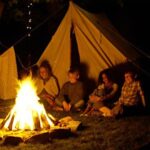by
Liz Childers

The Occupy movement brought the problem of illegal camping came to the forefront of the public eye. Visitors to cities such as Whistler, British Columbia and St. Petersburg, Florida have seen how this awareness has trickled down to the more traditional form of camping.
The most infamous incident occurred two weeks ago at Fort De Soto Park in St. Petersburg. One group of campers made a video that listed their huge supply of alcohol for the weekend of partying they had planned at the campgrounds. That video was posted to YouTube, and the park rangers were notified through a Google news alert. The campers were kicked out of the alcohol-free park, and the person who reserved the campsite was banned for a year.
Illegal camping regularly plagues Whistler, an expensive resort town; however, few citations are given. A recent discovery of human feces by a body of water has made the illegal camping a bigger issue.
While camping is an escape from the cities and a way to truly enjoy nature, city laws permeate into the wilderness to govern where people can camp. These two incidents prove why this is necessary.
Many campers who are camping illegally are unaware of the tenants of Leave No Trace camping. This, combined with the lack of trashcans and bathrooms at sites where campers are illegally pitching tents, leads to littering. The other problem – campers who willfully break the rules within legal campgrounds – can ruin the camping experience for others.
There are two arguments that arise when illegal camping is discussed. One is the idea that city governments and law enforcement have more pressing issues than searching out and citing illegal campsites. The other argument is that the woods are for the public, who should be allowed to camp wherever they want in the open land.
What do you think? Is it appropriate for cities and park officials to govern where you can camp? Do you think they should tighten restriction in order to protect our woodlands?



